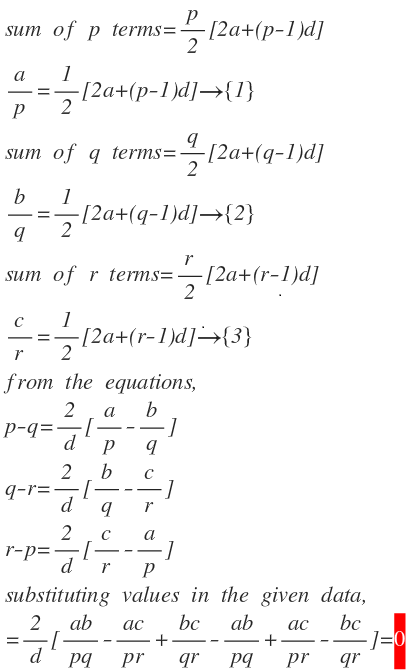Arithmetic Progression
p a ( q − r ) + q b ( r − p ) + r c ( p − q )
In an arithmetic progression , the sum of the first p , q , r terms are a , b , c respectively. Compute the expression above.
The answer is 0.
This section requires Javascript.
You are seeing this because something didn't load right. We suggest you, (a) try
refreshing the page, (b) enabling javascript if it is disabled on your browser and,
finally, (c)
loading the
non-javascript version of this page
. We're sorry about the hassle.
6 solutions

how many points for this ? 100?
I considered a trivial case.
Ya, same here.
To prove this for distinct p , q , r and a , b , c :
Note that
S
n
n
S
n
Δ
(
n
S
n
)
Δ
n
Δ
(
n
S
n
)
p
−
q
p
a
−
q
b
p
a
(
q
−
r
)
+
q
b
(
r
−
p
)
+
r
c
(
p
−
q
)
=
0
=
2
n
[
2
A
+
(
n
−
1
)
D
]
=
A
+
2
n
−
1
D
=
2
D
Δ
n
=
constant
=
q
−
r
q
b
−
r
c
There are no such rules that p,q,r are distinct, so I set p=q=r, then the answer is absolutely 0
In other way, you set a = b = c = 0 , it will get 0 also.
nice. it will be helpful for JEE
I solved exactly in that way .But after solving, I thought it could be guessed so easily
How did I deal with the problem?
I just assumed a very simple Arithmetic Progression as under: 1 , 2 , 3 , 4 , 5 , . . . Now, let p, q and r be 1,2 and 3 respectively. Hence we have a=1, b=3 and c=6. Then I just put the values into the expression and got ( − 1 ) + ( 3 ) + ( − 2 ) = 0 as outcome :)
We cannot tell ......p,q and r can be any value...it does not always mean that p,q and r have to be in AP. They are just terms in an ap.
Log in to reply
Even I don't say that p, q and r are in AP. It's just a coincidence. More over the given problem is general which means any sequence can satisfy the conditions given hence I took the series for easiness :)